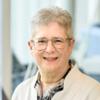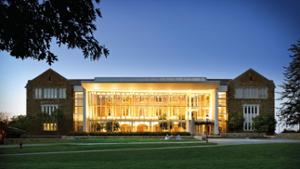
Chemistry
For all students, whether through coursework or research, the Chemistry Department fosters the development of creativity, rigor, and flexibility in problem solving along with the ability to communicate ideas and processes with clarity and precision in the context of chemistry.
About the Major
At Hamilton, students don’t just study chemistry — they help break new ground as members of a scientific community while developing a strong background for a wide range of health-related professions or graduate work in specialized science fields. Small classes and labs foster mentoring relationships and one-on-one dialogue. Professors encourage students to pursue independent projects and collaborate with them on original research.
Students Will Learn To:
- Apply scientific reasoning to explain chemical phenomena as evidenced by performance on a standardized exam (breadth of chemical reasoning)
- Demonstrate the ability to conduct a sustained research project (chemical research)
- Communicate chemistry’s impact on society with attention to ethics and inequities in science from which science policy decisions are made (impact of chemistry)
A Sampling of Courses

Chemical Approaches to Solar Energy Conversion
An introduction to the fundamental electro- and photochemical processes that enable harvesting of solar energy. Topics to be addressed will include the theory and application of semiconductor materials as solar cells to capture light energy, as well as the electrochemical processes that enable the storage of that energy as solar fuels (artificial photosynthesis) or in grid scale batteries. The course will revolve around readings from the primary chemical literature.
Explore these select courses:
Structure and bonding of organic compounds and their acid-base properties, stereochemistry, introduction to reactions and reaction mechanisms of carbon compounds and the relationship of reactivity and structure. Three hours of class and three hours of laboratory.
Meet Our Faculty
synthesis and luminescence properties of rare earth (lanthanide) sol-gel derived materials
Computational chemistry, electronic structure theory, physical chemistry, theoretical chemistry
analytical chemistry; environmental chemistry; mass spectrometry
Organic chemistry, inorganic chemistry, materials chemistry
Max Majireck
Associate Professor of Chemistry, Director of Biochemistry/ Molecular Biology
organic chemistry, natural products, medicinal chemistry and chemical biology
biochemistry, bioinorganic chemistry, enzymology, and natural product biosynthesis
organic chemistry, free radical reactions, reaction stereochemistry, and development of new synthetic methodology
structure-function biochemistry, RNA enzymes, biochemistry lecture and laboratory development and pedagogy, ocean microplastics, microplastics as microbiological habitats
physical chemistry, biophysical chemistry, and theoretical chemistry
biochemistry and chemical biology
Brandi Langsdorf
Director, Hamilton Analytical Laboratory and Lecturer in Chemistry
Analytical geochemistry
Careers After Hamilton
Hamilton graduates who concentrated in chemistry are pursuing careers in a variety of fields, including:
- Professor of Neurology & Pediatrics, University of Pennsylvania
- Engineer, Lockheed Martin
- Global Skincare Development Coordinator, Estee Lauder
- Public Relations Director, AT&T
- Clinical Research Coordinator, Massachusetts General Hospital
- Oral & Maxillofacial Surgeon
- Senior Food Technologist, Rich Products
- Patent Attorney, The Eclipse Group
- Vice President, athenahealth
Explore Hamilton Stories

Crespo ’25, Jaboldinov ’26 In Trudeau Institute Biomed. Pilot Program
Chrissy Crespo ’25 and Alinur Jaboldinov ’26 are the first Hamilton students to participate in the Trudeau Institute’s Biomedical Research Scholars Program in Saranac Lake, N.Y. The program includes five courses designed to develop students’ research skills and understanding of immunology, but its shining focus is the intensive immunological research experience.
Kudos! Student Achievements Late Fall Semester 2025
As the fall 2025 semester came to a close, a number of Hamilton students kept busy presenting research at conferences and collaborating with faculty on professional papers that were published.
Contact
Department Name
Chemistry Department
Contact Name
Karen Brewer, Acting Chair
Clinton, NY 13323
















